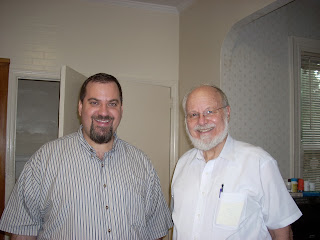Who really wrote Unetaneh Tokef?
I like to think I'm pretty savvy about the origins of various minhagim, and I usually look at the legends behind the various customs with a skeptical eye.
But I only learned today that the Rosh Hashana prayer "Unetaneh Tokef" was found in the Cairo Geniza, in a manuscript dating to the 8th century. That is far earlier than the traditional belief in the story of R Amnon of Mainz in the 10th or 11th century, who wrote it as he lay dying because of his refusal to convert to Christianity.
I had already viewed the details of this story as suspect, because it smacked of being too perfect in its emotional impact. But until today, I still assumed that the authorship, and its time period, were relatively accurate.
It turns out that the issues with the authorship are well-known, and have been for half a century. The Geniza manuscript was known to scholars as early as the 1950's. And that is not not the only issue with the traditional story. See this Schechter Institute article for more details.
Yet the Artscroll Machzor, first published in August of 1985, still reports the traditional story faithfully, the only possible concession to reality being perhaps the words "This is the story behind it".
That leaves two options:
a) The editors at Artscroll were simply unaware of the scholarship that showed an earlier composition date. If so, that's a shame, and shows yet again that despite their beautifully typset and bound volumes, there is a willful ignorance of anything outside the Yeshiva walls that pervades the atmosphere there. Yes, I didn't know the facts either, but whenever I write or prepare a topic for public airing, the first thing I do is research it fully. They did not.
b) They know about the scholarly view, yet discount it. Now I can understand rejecting scholarly ideas about Biblical authorship - that would challenge Orthodox dogma, and I certainly don't expect Artscroll to embrace, or even acknowledge ideas that go against the foundations of their beliefs. But this is just authorship of a medieval poem! There is absolutely nothing "dangerous" in adding a couple of lines to the commentary acknowledging that the traditional story that follows isn't factual, even if some might still find it meaningful.
Either way, they choose to close their eyes and ears to anything that doesn't conform to the ever narrowing "Torah True" ideology. And that's a real shame.
As for me, the authorship doesn't matter. It was written by a Jew and is about repentance. And when we all loudly recite, in unison, the words
ותשובה ותפילה וצדקה מעבירין את רוע הגזרה
I will feel their power as I always have, irrespective of authorship.
But I only learned today that the Rosh Hashana prayer "Unetaneh Tokef" was found in the Cairo Geniza, in a manuscript dating to the 8th century. That is far earlier than the traditional belief in the story of R Amnon of Mainz in the 10th or 11th century, who wrote it as he lay dying because of his refusal to convert to Christianity.
I had already viewed the details of this story as suspect, because it smacked of being too perfect in its emotional impact. But until today, I still assumed that the authorship, and its time period, were relatively accurate.
It turns out that the issues with the authorship are well-known, and have been for half a century. The Geniza manuscript was known to scholars as early as the 1950's. And that is not not the only issue with the traditional story. See this Schechter Institute article for more details.
Yet the Artscroll Machzor, first published in August of 1985, still reports the traditional story faithfully, the only possible concession to reality being perhaps the words "This is the story behind it".
That leaves two options:
a) The editors at Artscroll were simply unaware of the scholarship that showed an earlier composition date. If so, that's a shame, and shows yet again that despite their beautifully typset and bound volumes, there is a willful ignorance of anything outside the Yeshiva walls that pervades the atmosphere there. Yes, I didn't know the facts either, but whenever I write or prepare a topic for public airing, the first thing I do is research it fully. They did not.
b) They know about the scholarly view, yet discount it. Now I can understand rejecting scholarly ideas about Biblical authorship - that would challenge Orthodox dogma, and I certainly don't expect Artscroll to embrace, or even acknowledge ideas that go against the foundations of their beliefs. But this is just authorship of a medieval poem! There is absolutely nothing "dangerous" in adding a couple of lines to the commentary acknowledging that the traditional story that follows isn't factual, even if some might still find it meaningful.
Either way, they choose to close their eyes and ears to anything that doesn't conform to the ever narrowing "Torah True" ideology. And that's a real shame.
As for me, the authorship doesn't matter. It was written by a Jew and is about repentance. And when we all loudly recite, in unison, the words
ותשובה ותפילה וצדקה מעבירין את רוע הגזרה
I will feel their power as I always have, irrespective of authorship.


This is the same Artscroll who insists (with little support) that Elazar HaKalir was a Tanna; this is the same Artscroll that continues to refer (with no basis at all) that there's something called "Targum Yonasan" on the Torah.
ReplyDelete